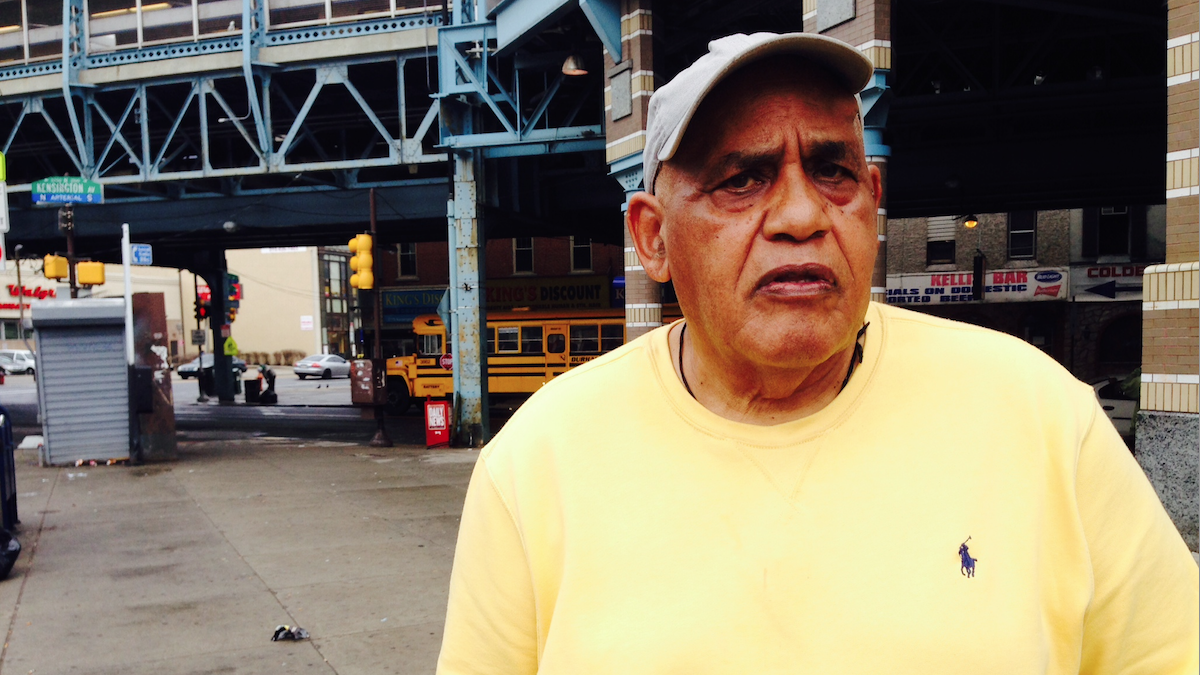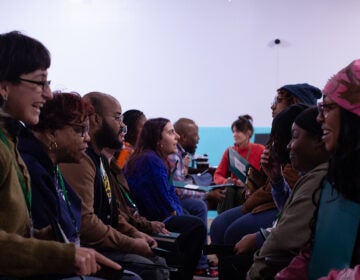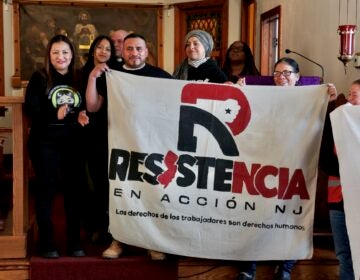What Milton Street would’ve said if tonight’s campaign launch didn’t get snowed out

Milton Street postponed tonight's mayoral-campaign launch until March 5. (Brian Hickey/WHYY)
T. Milton Street Sr. was gonna launch his latest mayoral campaign at a North Philly church tonight.
He was going to field questions from the press and members of the public, both of whom would be restricted to only ask about the Philadelphia Gas Works (PGW) non-sale, schools (both funding, vouchers and violence) and Street’s “414 Community Movement” to build a paid neighborhood-patrol force.
Forecasts of snow prompted Street to postpone the event Monday, fearing that the precip could lead to an attendance dip.
Last Friday, Street set aside some time at an Aramingo Avenue IHOP table to offer NinetyNine a preview of his script.
Now that the snowdate was called into action, circle 5 p.m. on March 5 on the calendar for the event itself and consider this a waaaay-sneak preview.
Granted, one never can predict the ebbs and flows of a Streetian production (see: the ’07 Dilworth Plaza coffin), but this is what he said he planned on discussing from the New Jerusalem Baptist Church pulpit.
From the mouth of Milton
On PGW: “One of the worst, most critical mistakes made in years was not selling PGW. It was perpetuated because the [City] Council President [Darrell Clarke] went public with ‘we’ll put half of the money in schools and half in the retirement fund.’
“What that did was notify Harrisburg that Philadelphia has some money for its schools. Ok, ‘they’re going to have two, $300 million.’ Then, you ignore the process. You don’t let the council people stand up and vote so, now, the council president can’t say ‘I couldn’t get the votes’ when we go back to Harrisburg.
“What we’ve done, through council in the city of Philadelphia, is mandate that we sell the gas company, use that money before we’ll get a compassionate ear from Harrisburg. So, Harrisburg is going to say to us, ‘Go back down there. Do everything you can to raise the money, including selling the gas company.’
“So, one of my first actions as mayor would be to find a buyer and sell the gas company and dedicate every dime to education.”
How schools relate: “You already have to change the conversation in Harrisburg as it pertains to Philadelphia’s schools.
“The conversation has to change from ‘those are a bunch of hoodlums down there in Philadelphia that don’t want to learn, teachers don’t want to teach there, it’s a bad situation, the good people are starting to run to the charter schools, they’re trying to get out of the public-school system.’
“The conversation has to become ‘the people in Philadelphia have a model school district when it comes to discipline, when it comes to no foolishness,’ and then they’ll start talking about ‘man, those people are serious about education. They sold the gas company, they stopped the violence, so now we’ll give ’em a sympathetic ear and I won’t get as much backlash from my constituents if I send money to a school district that’s worthy.'”
On his state-senate experience: “I am the only black person in the state of Pennsylvania that served both in the Republican caucus, with the conservatives, and the Democratic caucus, with the liberals.
“What you have is four different mindsets in the legislature, and if you don’t understand those, you won’t know how to approach it. You have the mind that’s closed and never open; that’s the mind of the bigot. You have the mind that’s open and never closed; those are the people defined by their inability to make a decision. The mind that’s open on the bright side, but closed on the dark side; that’s your optimist. The mind that’s open on the dark side, but closed on the bright, that’s your pessimist. Well, the bigots control it.
“So, you know that if you have a group of legislators up there who don’t even want you to vote with a school district that’s 75,000 black [students], 25,000 Hispanics, 19,000 Caucasian and the rest is ‘others,’ they’re not going to give you money. If you don’t understand that, then you have a problem because you’ve made some tremendous mistakes [vis-à-vis the PGW ‘blunder.’]”
On charter vs. public: “The first thing I would do is put a moratorium on charter-school expansion. No more charter schools, because there’s no oversight. We don’t know what they do. The emphasis of some of these schools is maximizing profits, not maximizing quality education.
“There is absolutely no reason why there can’t be full funding for the entire school system so that everybody has access to quality education, teachers have the opportunity to teach in an atmosphere that’s conducive to teaching without interruption and the children have a right to maximize their God-given learning potential in an atmosphere where they can excel. It sounds a heavy lift, and it is, but it’s not impossible. That’s the direct I’d be going in: Quality education across the board.”
Why confine questions to these topics: “These questions give me an opportunity to let people know that I have some definitive answers to some of those questions. That I’m not just running for mayor; I have thought through this stuff. I’ve given it a lot of thought. Because I’ve represented throughout my career poor people, people who don’t count, what happens is, you have to be the community activist and lead the demonstrations just to get their attention. It’s difficult. The sensationalism, the things you have to do just to get the attention of those who are making decisions, it’s news. It sells newspapers. And the major news media wants that sensationalism. They don’t want to know that Milton has a brain and he can think, ok?
“I have legislation that I’ve put in to fund the schools 32 years ago. The same discussion we’re having today, I had 32 years ago, to develop an independent funding source for our schools. I’m not clairvoyant, but I have perception. I can think.
“The people that I represent, their numbers are so large that if they mobilize and vote, then we change the balance of power. That value system of the poor is now calling the shots rather than the value system of the elitists.”
On legalized marijuana: “Thirty years ago, check the record, I put in legislation to legalize, decriminalize marijuana. I said this is the largest cash crop in America going forward. The farmers would have been able to raise 800 hemp plants. They would make over $800,000. The marijuana would only be sold ‘Pennsylvania-grown.’ Now, people are saying, ‘Wow, what’s wrong with marijuana? Let’s do it!'”
On race, leadership and violence: “When I first entered the political process, you couldn’t tell me that white people weren’t the cause of our problems. Just couldn’t tell me that. We had a white mayor, white council president, white district attorney. So, I’m out there banging on [former Mayor Frank] Rizzo saying, ‘Man, if we had a black mayor, it could solve our problems.’
“Well now, we have a black mayor, black council president, black district attorney, and they’re worthless. They can do nothing. We have a 3-year-old shot dead; 15-year-old shot dead, honor student; two pregnant women shot dead; off-duty police officer shot dead and they can do nothing. They’re cotton candy. They lack substance. So, what’s wrong with the system? You blame white people, put black people in and you get a worse result!
“You can’t fix it unless I move my voters to join the 414 Community Movement to Stop the Violence. They will have membership cards; they’ll be 414 Democrats, ok? Political power is the ability to achieve purpose to bring about political, economic and social change, but it’s in people. If you can form an organization that has 25-, 30-, 40,000 people, then you change it. Anybody who wants to run for office has to come to you. … We have about 2,500 members now.”
On his chances: “I believe that, having the ability to get my message out, people are going to respond. The people who aren’t taking me seriously don’t share my value system. It depends on my ability to get my message out to them. [Other candidates] have to deal with me and my questions at the debates.”
WHYY is your source for fact-based, in-depth journalism and information. As a nonprofit organization, we rely on financial support from readers like you. Please give today.




